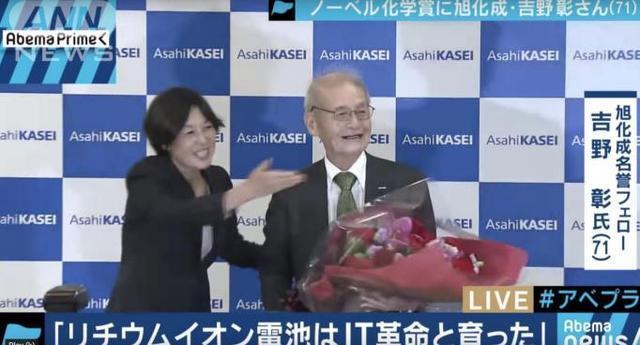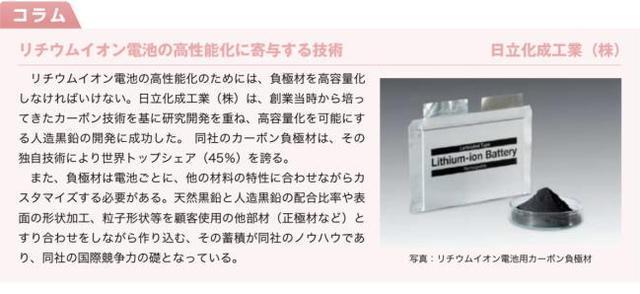2019-10-30

The fourth industrial revolution has arrived. It is not it technology that plays a leading role, but the integration of lithium-ion batteries, AI and IOT, which can be called the ET (energy and environmental technology) revolution.
This conclusion is reached by Akira Yoshino, a Japanese scholar who won the 2019 Nobel Prize in chemistry on October 9, who won the Nobel Prize in chemistry with lithium battery technology.
This Nobel Prize is well deserved.The emergence of lithium batteries will not only change the society as small as mobile phones and tablet computers in daily use, but also indispensable for electric vehicles with bright prospects in the future. The invention and commercialization of lithium batteries have imperceptibly changed the way of human life.
On October 18, Akira Yoshino was invited to deliver a speech in Chiyoda District of Tokyo. About 70 people, including many government members and many officials of the Ministry of education, culture, sports, science and technology of Japan, attended the meeting.
In this speech, Akira Yoshino talked about the technology of using "polyacetylene" to develop lithium-ion batteries. This technology was developed by Shirakawa Yingshu, the Nobel Prize winner in 2002. Akira Yoshino hopes to combine academia and industry, apply the technology to products, and conform to the market economy.
The application of lithium batteries in notebook computers and smart phones gave birth to the IT revolution in the late 1990s.Nowadays, lithium batteries are used in a wider range, especially in the increasingly popular electric vehiclesStudy how to soften solar energy into electric energy, store it in lithium battery and use it.
Mr. Yoshino said: the IT revolution is widely regarded as the third industrial revolution, but from now on,The fourth industrial revolution is about to happen - the integration of lithium-ion battery technology with AI and IOT can be called the ET (energy and environmental technology) revolution.
According to Mr. Yoshino, the combination of artificial intelligence, Internet of things and lithium battery development is the general trend of future development, and it is predicted to become the fourth industrial revolution.
thatBefore the next industrial revolution, how long will it take for the development of technology today, perhaps only five to ten years.
Therefore, in addition to accelerating the development of relevant technologies at this stage, the issue of how to integrate AI, Internet of things and lithium battery technologies also needs to be deeply considered.
At present, although the combination of the Internet of things and lithium batteries is widely used, for long-term use scenarios, they are faced with problems such as short service life, inability to use in low-temperature environments, and high product maintenance costs.
From the current combination of artificial intelligence and lithium batteries, there are mainly two aspects. The first is to help the research and development of lithium battery materials. With less experimental data, we can use the method combined with artificial intelligence to predict the characteristics of new high-performance materials of batteries, solve the problems in material development, and reduce the research and development time of battery materials.
The second is to use artificial intelligence system to optimize battery usage habits and prolong the service life of the battery and single use time.
At present, not only China, but also Japan, the United States, Germany and other countries are actively involved in the research and development of battery technology. Companies such as Toyota, a Japanese auto giant, have not only invested heavily in various battery directions, but also made standards for the entire industry.
From the perspective of China's lithium battery market, the overall trend continues to rise.In 2018, China's output of energy storage lithium batteries increased by 48.57% year-on-year. It is expected that the annual output of 2019 will reach 6.8gwh, and will continue to rise in the next five to ten years.
In order to cope with the possible fourth industrial revolution in the future, the Ministry of economy, industry and trade of Japan pointed out in this year's lithium battery report that although China is now the main manufacturer of lithium batteries, enterprises in their own country (referring to Japan) should master the core technology firmly. For example, Hitachi chemical industry accounts for 45% of the development of battery materials in the world with the technology of carbon cathode materials.
The practice of Japanese enterprises has inspired China that while striving to develop lithium battery technology, China should maintain the independence and integrity of technology, so as to establish industry standards or dominance, which may occupy a certain advantage in the fourth industrial revolution.

Article source:Battery net
0755-89480969
info@powercome.hk
B1202, building 1, Mogen Fashion Industrial Park, No. 10, shilongzi Road, Xinshi community, Dalang street, Longhua District, Shenzhen
www.powercome.hk